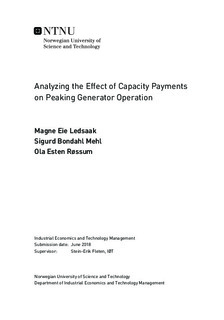Analyzing the Effect of Capacity Payments on Peaking Generator Operation
Master thesis
Permanent lenke
http://hdl.handle.net/11250/2575680Utgivelsesdato
2018Metadata
Vis full innførselSamlinger
Sammendrag
This thesis aims to study the effects of capacity payments on the operational decisions of plant managers for peaking units in the Pennsylvania-New Jersey-Maryland Interconnection (PJM). We achieve this through a structural estimation of maintenance and switching costs between the operational state, the standby state and retirement of generating units. We have focused on the period from 2001 throughout 2016 --- a period where we have identified some significant changes in the power market dynamics. We conduct a counterfactual analysis on the level of capacity payments to study the effects of introducing a capacity market in 2007. The reliability of the power system depends crucially on the availability of flexible peaking units to cover load in periods of high demand. Therefore, an understanding of the real costs facing the owners of these units is essential in order to enforce policies that ensure sufficient peak capacity in the power system. Capacity markets are introduced as a means of compensating capacity, and our study aims to analyze the effects of this additional market on switching behavior.
The empirical data shows less switching between states after the introduction of capacity remunerations. We find that the role of peaking units has changed, with the units being dispatched more often. In the counterfactual analysis, we find a clear connection between the level of capacity payments and switching. We conclude that the current level of capacity payments in PJM incentivizes peaking units to stay in the operational state.
